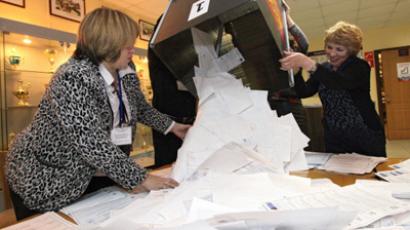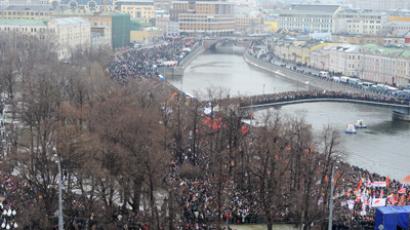RT recalls 2012: Putin’s back, opposition turmoil, Pussy Riot prank
For Russia 2012 was a turbulent year. Presidential votes and a re-launched opposition movement drew thousands of protesters and counter-protesters - not to mention Pussy Riot’s cathedral performance splitting the public even further.
Russia plunged into 2012 amidst high political drama. Divisive elections to the State Duma were followed by stage a presidential poll in March. The parliamentary race had brought a victory to the ruling United Russia party, who secured 238 seats out of 450. There was no landslide like four years before, but the opposition felt outraged that there was still a victory – alleging fraud had taken place.Massive December protests continued into winter and spring. The demonstrators, both independent and aligned to various opposition parties, demanded parliamentary elections restaged and the central election commission investigated. Officials responded to protests by looking into fraud claims and installing web cameras at polling stations across Russia to live-broadcast the polling process of the presidential ballot.
At the same time, Putin supporters started gathering for their own rallies. They accused the other side of trying to instigate “an orange revolution” in Russia and hailed Putin as the only true leader for the country.March’s election saw Vladimir Putin retake his presidential seat for a third term, with over 63 percent of vote, this time for six years. Talking to his supporters under the Kremlin walls, the newly elected president made headlines after cameras caught tears coming down his cheeks.
Protesters started bringing new banners to their rallies: ‘Putin must go!’ In May, however, the atmosphere changed. On the eve of Putin’s inauguration over 400 people were detained in Bolotnaya Square after clashes broke out between protesters and police. Twenty police officers and almost as many demonstrators were injured.
Twelve people remain under arrest since the May 6 incident on charges of riot instigation. On Friday, prosecutors said the investigation was over and soon the cases will be handed over to the court. A thirteenth person has already been sentenced to 4.5 years in jail for brutally attacking five police officers.In the wake of the violence, MPs have also passed a bill which bans unsanctioned demonstrations and pens fines for order violations at up to 20,000 rubles ($650) or even to 300,000 ($9,800) if protesters damage state or private property. But in other initiatives direct elections of regional governors were reintroduced. Since 2006, the governors had been appointed by the president. With all the activity and recent election to the Opposition Coordination Council, political analysts note the opposition has lost its steam. Many argue the movement still needs to create a viable platform that reaches all Russians, as well as put forward unified leaders.
Pussy Riot in jail
In the final leg of the presidential race, a feminist punk-group called Pussy Riot staged a performance in Moscow’s central Cathedral, Christ the Savior. Three members of the group were arrested and placed in custody after attempting to sing a mock prayer “Virgin Mary, Drive Putin Away.”On August 18, a Moscow court sentenced Nadezhda Tolokonnikova, Maria Alyokhina and Ekaterina Samutsevich to two years in a medium-security prison for hooliganism motivated by religious hatred and enmity. Two months later Samutsevich was released on probation, while the two others made their way to the assigned jail.Controversy surrounded the case from the very beginning as Pussy Riot’s supporters, inside and outside Russia, viewed their act as purely political, while many Orthodox believers considered the prank an outright insult to their religion.
However, in the wake of the jail sentence handed down, many officials said it was over the top- especially considering the time the three girls spent in custody, before and during the trial.“I think that they know already what it is like in prison," Prime Minister Dmitry Medveded said in November, “The state has already demonstrated to them its punitive possibilities, and explained to them that they must behave properly from the legal and moral points of view.”After the sentence was announced, the Russian Orthodox Church asked for mercy on the Pussy Riot members. Later, however it called for protection from blasphemy.To that, MPs proposed to introduce criminal responsibility for insults to religious feelings. The bill, submitted to the Lower House in September, provides up to five years in prison and fines of up to 300,000 rubles (under $10,000) for offenders.
‘Foreign agents’ bill and US adoption ban
The legislative fallout was spread gradually throughout the year. Thus, in July Vladimir Putin signed into law a bill giving the status of foreign agents to non-profit organizations sponsored from abroad and involved in political activities. Starting with November, such organizations are subject to yearly audits. In the press, every comment by such a group should be accompanied by the “foreign agent” status. Groups refusing to register as foreign agents will be fined and might be banned. MPs said the bill falls in line with international practice and in general makes foreign countries’ activities in Russia more transparent. Many NGOs, including the Moscow Helsinki Group and Transparency International, said they would boycott the new law since they do not wish to acquire a foreign agent status. They could give up donations from abroad if the court makes them, but for most of them it would mean closing offices altogether, since Russian officials and businesses are reluctant to sponsor such organizations.December brought another much disputed piece of legislation – an official ban on US citizens adopting Russian children, which was passed by the parliament as a counter-measure to Washington’s Magnitsky List.Sponsors of the law justify it with at least 19 cases of abuse of Russian children by their American adoptive families. They complained that the punishment for the offences issued by the US justice system was disproportionately mild, while Russian diplomats were prevented from giving enough input in the prosecution of such cases. Critics of the bill said it imperils the foster children, including those with special needs, who will now be barred from living a happy life in American families. They say the Russian authorities have made those kids victims of a political row between Moscow and Washington. Opposition to the law came from some cabinet ministers and other top Russian officials, among others.Moreover, the tit-for-tat attitude to US-Russian relations has made political analysts worry that the two countries might be turning away from their“reset” and could soon plunge into renewed tensions.














